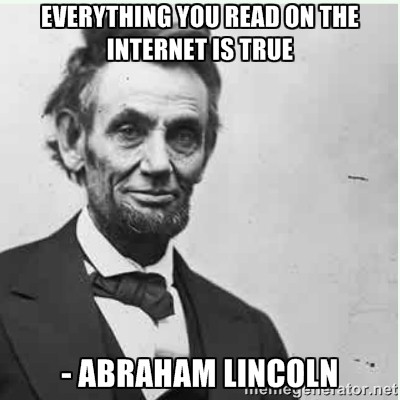Word Nerd: 5 Famous Misquotations (What Wasn’t Said and Who Didn’t Say it)
18 Jul
“(I)t is not desirable to confine knowledge to whatever can be put into a
useful shape for examinations, drawing-rooms, or the
still more pretentious modes of publicity.”
—T.S. Eliot, Tradition and Individual Talent
Quotations are a natural intellectual currency. Whether you’re a literature major, or a movie buff, an amateur historian or a sci-fi nerd – you will have words, especially other peoples’ words, strewn around your vicinity. Maybe your goodbyes are the all too tired ‘Hasta la vista, baby!’, or the slightly less well known, “Peace and long life.” Or, you could just be that person. You know, the one who drops lines from Milton, Shakespeare and Wordsworth like coins from a ripped wallet.
Like T.S. Eliot. His writing is liberally strewn with quotations. In poetry and prose. For him, it was a technique (“Immature poets imitate; mature poets steal,” he had said). As a student, you may need to quote to substantiate your argument while writing an academic essay or giving a valedictorian speech. But, if you fail to investigate and credit your sources carefully, it’s unlikely that literary renown will be your fate. More likely that you’ll get accused of plagiarism and/or stupidity.
You won’t be in poor company either. Presidents have frequently misquoted other Presidents. Abraham Lincoln, we reckon is the ‘Most Misquoted American President of All Time.’ (“You can’t fool all the people all the time”, “Whatever you are, be a good one”, etc). Everyone from Clinton to Obama has falsely attributed quotes to him. Coming down a few notches, misquotes are obviously a thing with the internet.
Even if they’re on Wikipedia. So it’s entirely up to you to assess the credibility of your sources.
Some utterances, false as they are, gain proverbial status over time. We’ve found five of the best known ones. We bet you’ve used them at one point or another. And there’s no harm in still using them, as long as you know where, and who, they came from. It’s more fun that way!
1. “Elementary my dear Watson.” —Sherlock Holmes
If Holmes wanted to say it, he had the space of 56 short stories and 4 novels in which to say it. But, he didn’t.
So who said it? Psmith, a character created by P.G. Wodehouse. Even Holmes wouldn’t have guessed that!
2. “Be the change you wish to see in the world.” – M.K. Gandhi
No matter how many t-shirts shout it out, Gandhi did not utter these words. This is a nice summing up of what he did say – “If we could change ourselves, the tendencies in the world would also change. As a man changes his own nature, so does the attitude of the world change towards him. … We need not wait to see what others do.”
Not as pithy. But then, not everyone is Oscar Wilde.
3. “Well – behaved women rarely make history.” – Marilyn Monroe
In spite of what Pinterest, Tumblr and the interwebs might say, the author of this quote was not Monroe but. . . a history professor!
Originally, the quote appeared in a piece published by the “American Quarterly” in Spring 1976. The author of that piece was Laurel Thatcher Ulrich, who is a Pulitzer prize winning historian and a professor at Harvard.
4. “The only two certainties in life are death and taxes.” – Mark Twain
According to the internet, Mark Twain is supposedly the author of most of the wittiest sayings that the human race came up with. Including this one.
Originally though, the phrase ‘Things as certain as death and taxes. . .’ appeared in Daniel Defoe’s “The Political History of the Devil.” This was in 1726.
In 1789, Benjamin Franklin wrote in a letter to a friend, ‘in this world nothing can be said to be certain, except death and taxes.’
Moral of the story: other people say witty things too!
5. “Let them eat cake.” — Marie Antoinette
Marie Antoinette never said these precise words to express her disdain for peasants who couldn’t afford bread. In fact, nobody seems to have used these precise words.
Jean Jacques Rousseau came close with his, “Let them eat brioche.” This was in the “Confessions”. But brioche is not cake just as Rousseau was not the Queen.
And yet, the misquote added fuel to the fire of French discontent, and turned the country against the monarchy.Any misquotes you’d like to share? Leave a comment below!
Check out previous Word Nerd posts at this link! We welcome your contributions and suggestions – email us


No comments yet